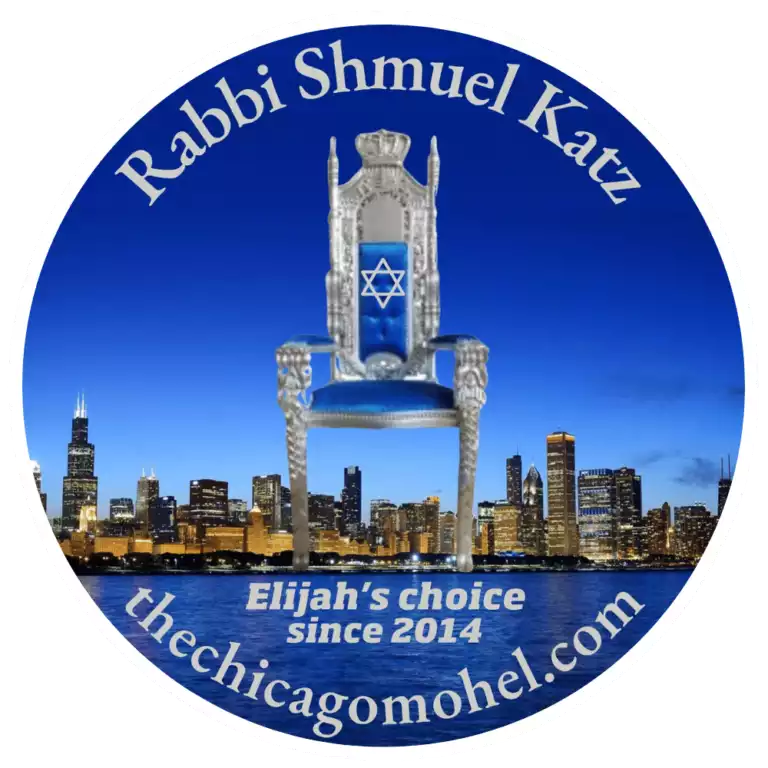Circumcision: Answering the Who, What, Where, When, Why, and How
Who Should I Choose to Perform My Son’s Circumcision?
When it comes to choosing the right professional for your son’s circumcision, parents have several options. While hospital-based procedures performed by doctors are available, many families—both Jewish and non-Jewish—choose to have a Mohel perform the circumcision. But why is a Mohel the preferred choice for so many?
A Mohel is a specialist trained in the Jewish tradition of Bris Milah (ritual circumcision), an ancient practice dating back thousands of years. Unlike doctors who perform circumcisions as a small part of their medical practice, a Mohel focuses exclusively on circumcision, often performing far more procedures than the average physician. This extensive experience ensures a level of precision, efficiency, and comfort that is difficult to match. Mohelim are also known for their ability to perform the procedure quickly and with minimal discomfort for the baby, often using specialized techniques to promote a smooth healing process.
Beyond technical expertise, a Mohel offers something more: a meaningful, personalized experience. For Jewish families, a Bris Milah is not just a medical procedure—it is a sacred covenant with deep religious significance. Even for families outside of the Jewish faith, choosing a Mohel can provide a more personal and compassionate approach, often in the comfort of their own home rather than a hospital setting.
In order to qualify as a Mohel for the Bris Milah ceremony, one must not only be surgically proficient but also a practicing, observant Jew who faithfully upholds all the laws of the Torah, including Shabbos, Kashrus, Family Purity, and all other mitzvos. The Shulchan Aruch (Yoreh De’ah 264:1) states that when selecting a Mohel, the two primary qualities to seek are that he should be the most surgically skilled (mumche) and the most righteous (tzaddik).
A Mohel serves as the agent (shaliach) to bring a Jewish child into the Covenant of Avraham Avinu. In order to properly fulfill this role, he himself must be fully committed to the covenant by observing all of its commandments. One who desecrates Shabbos or disregards fundamental mitzvos cannot serve as a valid agent for this sacred duty. If a Bris were performed by such a Mohel, the circumcision is halachically invalid, as he is not a proper representative of the Torah’s covenant. In such a case, the Bris would need to be remedied with a follow-up procedure (hatafas dam bris) performed by a fully observant Mohel to ensure that the child is properly entered into the Jewish people in accordance with halacha.
There are many highly qualified Mohelim across the United States, particularly in major metropolitan areas. In the Midwest alone, families have several choices when looking for a Mohel to perform their son’s circumcision. One such Mohel is Rabbi Shmuel Katz, an experienced Orthodox Jewish Mohel based in Chicago, IL. Rabbi Katz has earned the trust of countless families, both Jewish and non-Jewish, by providing expert circumcision services with the highest standards of care.
Rabbi Katz performs Bris Milah ceremonies in synagogues, social halls, and homes. He also offers home circumcision services for all faiths across the Midwest, ensuring that families who value the comfort and intimacy of their own space can receive expert care without traveling to a medical facility. Additionally, he performs clinical circumcisions at Kids First Pediatric Partners in Skokie, IL, providing a professional medical setting for parents who prefer it.
Ultimately, the choice of who performs your son’s circumcision is a deeply personal one. Whether for religious, cultural, or medical reasons, selecting an experienced Mohel like Rabbi Shmuel Katz can provide both exceptional surgical skill and a meaningful experience that honors the significance of this important milestone.
What Is Circumcision?
Circumcision is the surgical removal of the foreskin, the thin layer of skin covering the head of the penis. It is one of the oldest known surgical procedures, practiced for thousands of years across various cultures and religions.
In the Jewish tradition, circumcision—known as Bris Milah—is a covenantal act that symbolizes the sacred bond between the Jewish people and G-d. It is performed on the eighth day of a baby boy’s life, barring any medical concerns that would necessitate a delay. The procedure is conducted by a Mohel, who is trained in both the surgical and ritual aspects of the Bris.
The procedure itself is relatively quick, typically taking just a few minutes. A skilled Mohel, such as Rabbi Shmuel Katz, uses specialized techniques and topical ointment to ensure minimal discomfort and an optimal healing process. Many families appreciate the gentle, personal approach that a Mohel provides, whether the circumcision takes place as part of a religious ceremony or as a private procedure in a clinical or home setting.
Where Should a Circumcision Be Performed?
The location of a circumcision depends on religious customs, personal preferences, and medical considerations. Orthodox Jewish families most commonly choose to hold the Bris Milah in their synagogue (shul), often surrounded by family, friends, and their community. This setting emphasizes the religious and communal nature of the ceremony.
Other Jewish families, and many families from other religions and cultures, often prefer to have the circumcision at home or at the home of a family member. A home setting allows for a more intimate experience, where the baby and family can be comfortable in a familiar environment. This also allows the parents the convenience of staying at home and having the Mohel come to them, opting to avoid the need to travel with a newborn. Many families find the amount of time and stress saved by not needing to travel to the hospital or clinic worth more than any amount of money and are so grateful for that option.
For families who are not Jewish or those who prefer a clinical setting, Rabbi Shmuel Katz also performs circumcisions at Kids First Pediatric Partners in Skokie, IL. This provides a professional medical environment while still benefiting from the expertise of a Mohel. This option is also the most cost-efficient as it saves the Mohel the travel time.
Over the years, I’ve been honored to be called upon for circumcisions in a wide range of communities throughout Illinois and the Midwest. A large number of families reach out to me from the greater Chicago area — including neighborhoods like Skokie, Lincolnwood, and West Rogers Park, where there’s a strong and vibrant Jewish presence. I’m also frequently in the northern suburbs such as Northbrook, Deerfield, Highland Park, and Glencoe, where many young families are looking for a traditional and meaningful bris experience.
Outside the city, I often travel to places like Evanston, Naperville, and Arlington Heights, as well as communities further west such as Aurora, Downers Grove, and Wheaton. I’ve even received calls from as far as Champaign, Springfield, Peoria, and Bloomington-Normal, especially when families are looking for someone who understands the religious and cultural significance of the ceremony.
From time to time, I also travel beyond Illinois to neighboring states — including Wisconsin, Indiana, Missouri, and Iowa — when families are seeking a mohel they trust. Whether in a large metropolitan area or a quiet suburb, I feel privileged to be invited into people’s homes to help mark this important moment with care, precision, and heart.
In a later section in this article, I will clarify the different methods of circumcision. This will clarify some of the differences between choosing a hospital circumcision vs a circumcision at home or at the clinic. It is important to note that many parents wish to be in the room with their child during and immediately after the circumcision to comfort them. This is only possible with a Mohel in a home or clinical setting. Hospital policy will not allow parents to be in the room during the circumcision.
When Should Circumcision Be Performed?
As a mohel, I am often asked when the best time is to perform a circumcision. For Jewish families, the answer is clear: the Torah commands that a bris take place on the eighth day of a baby boy’s life, barring any medical concerns. A circumcision performed before the 8th day is Halachically invalid. If performed, the child is still considered Halachically uncircumcised, requiring a follow up procedure after the 8th day called Hatafas dam bris.
This timing of waiting until the 8th day is significant both spiritually and medically. The eighth day marks the point when a newborn’s blood clotting factors, particularly vitamin K and prothrombin, reach optimal levels, helping to ensure safe healing.
For those outside of the Jewish tradition, the best time to perform a circumcision is still within the first month of life. Medically speaking, newborns experience significantly less discomfort during this period. Studies have shown that pain receptors in the brain are not yet fully developed in the first few weeks of life, making the experience far less distressing than it would be later on. According to research published in The New England Journal of Medicine, newborns have an immature pain response compared to older infants and children, which is why early circumcision is often recommended by medical professionals.
Another important factor is the simplicity and efficiency of the procedure when performed in the newborn stage. A well-trained mohel or physician can complete the circumcision in just a few minutes—often no longer than a standard diaper change. The baby is typically calm and soothed by the time he is rediapered and placed back in his mother’s arms. The quick recovery and minimal discomfort seen in newborn circumcision make it an ideal time for the procedure.
As babies grow older, additional factors make circumcision more complex. One significant issue is the development of fat pads, which can distort how the skin lies on the penis. According to a study in Advances in Urology, penile fat pads become more prominent in many infants as early as the second month of life. This prominence increases over the following few months of life, sometimes leading to what is known as a “buried penis” appearance. This means that performing a circumcision on an older baby requires a mohel with a high level of experience and surgical precision to achieve aesthetically pleasing results. Additionally, the cost of circumcision increases as babies grow older, as the procedure becomes more involved and requires additional skill and time.
Ultimately, the best time to perform a circumcision is early in life, specifically on the 8th day of life for Jews and within the first month of life regardless of religion. Beyond tradition, science supports the benefits of performing the procedure within the first month. Whether for religious, medical, or personal reasons, an early circumcision ensures a smoother, safer, and more comfortable experience for both the baby and his family.
Why Should I Circumcise My Son?
The decision to circumcise your son is deeply personal, and parents often weigh religious, medical, and cultural factors when making their choice. As a Mohel, I have had the privilege of guiding many families through this decision, and I can share some of the most significant reasons why circumcision is chosen and valued.
1. Religious & Spiritual Significance
For Jewish families, circumcision is far more than a medical procedure—it is a sacred covenant with G-d. The Torah commands that a Bris Milah be performed on the eighth day of a baby boy’s life, marking his entry into the Jewish people. This mitzvah has been faithfully upheld for thousands of years, linking each new generation to an unbroken chain of Jewish identity and tradition.
2. Health & Medical Benefits
While circumcision is primarily a religious commandment, medical studies have shown it also offers health benefits, including:
✔ Reduced risk of urinary tract infections (UTIs) – Studies show that UTIs are significantly more common in uncircumcised male infants.
✔ Lower risk of sexually transmitted infections (STIs) – Research, including studies by the CDC and WHO, indicates that circumcised males have a lower risk of contracting HIV and other STIs later in life.
✔ Improved hygiene – A circumcised penis is easier to keep clean, reducing the likelihood of infections and inflammatory conditions such as balanitis.
✔ Decreased risk of penile cancer – Though rare, penile cancer is even less common among circumcised men.
3. Aesthetic & Social Considerations
Many parents choose circumcision for aesthetic and cultural reasons, ensuring that their son looks similar to his father or brothers. In communities where circumcision is common, parents often feel it is the norm and prefer that their son not feel different from his peers.
How Is Circumcision Performed?
There are several methods used for circumcision, particularly in hospitals. Some of the most common include:
- Gomco Clamp: A metal clamp is placed over the foreskin and tightened to cut off circulation. The foreskin is then surgically removed. This method takes about 10-20 minutes.
- Plastibell Device: A small plastic ring is placed under the foreskin, and a suture is tied around it to cut off blood supply. The excess skin falls off with the ring after about 7-10 days. The procedure itself takes 10-15 minutes.
- Mogen Clamp (hospital version): Similar to the Gomco but quicker, the Mogen clamp crushes and removes the foreskin in one step. This method is typically performed within 10 minutes.
While these methods are widely used in medical settings, they are not suitable for Bris Milah. According to Jewish law, the Torah requires that the foreskin be cut and removed. Any method that crushes the foreskin before removal does not fulfill this biblical requirement, as it destroys the tissue before cutting.
My Method – The Traditional Magen Shield
As a Mohel, I use the Traditional Magen (Shield) method, which has been practiced for generations and is the only valid method for Bris Milah according to Jewish law. This technique offers several key advantages over common hospital methods:
✔ Speed & Efficiency: The entire procedure is completed in well under a minute, often in the time it takes to change a diaper.
✔ Precision: The shield allows for an exact and clean cut without unnecessary trauma to surrounding tissue.
✔ No Crushing of Tissue: Unlike clamp-based methods, which crush the foreskin before removal, this technique avoids unnecessary damage.
✔ Much Gentler: The process is swift and minimally uncomfortable for the baby.
✔ No Need for Injections: Hospital circumcisions often involve injections of local anesthesia. Instead, I use a specialized topical ointment that is highly effective and avoids additional needle pain.
✔ Quick Recovery: Babies are typically calm and soothed immediately after the procedure, often back in their mother’s arms within moments.
✔ Halachically Valid: The foreskin is cut and removed as required by Torah law, without crushing or necrotizing the tissue first.
Obviously, I highly recommend the Traditional Magen Shield method over the more common hospital methods for a variety of reasons. It is faster, more precise, and far gentler on the baby, without the crushing of tissue or prolonged discomfort associated with clamps and rings. Quite important for the Jewish community, it is also the only method that fully adheres to the halachic requirements of Bris Milah, ensuring that the mitzvah is performed properly and in the most compassionate way possible.
Contact Rabbi Katz for your son’s circumcision
If you are interested in learning more about circumcision or scheduling a procedure, please feel free to contact me.
📞 Phone: 347-794-6322
📧 Email: thechicagomohel@gmail.com
🌐 Website: thechicagomohel.com
I am happy to answer any questions and guide you through this meaningful process with care and expertise.



